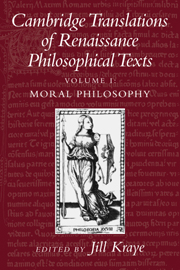Book contents
- Frontmatter
- Contents
- List of Translators
- Preface
- PART I CONCEPTS OF MAN
- PART II ARISTOTELIAN ETHICS AND THE SUPREME GOOD
- PART III ARISTOTELIAN ETHICS AND CHRISTIANITY
- PART IV PLATONIC ETHICS
- PART V STOIC ETHICS
- 16 Coluccio Salutati
- 17 Angelo Poliziano
- 18 Justus Lipsius
- 19 Francisco de Quevedo
- PART VI EPICUREAN ETHICS
- Bibliography of Renaissance Moral Philosophy Texts Available in English
- Index Nominum
- Index Rerum
17 - Angelo Poliziano
Published online by Cambridge University Press: 05 June 2012
- Frontmatter
- Contents
- List of Translators
- Preface
- PART I CONCEPTS OF MAN
- PART II ARISTOTELIAN ETHICS AND THE SUPREME GOOD
- PART III ARISTOTELIAN ETHICS AND CHRISTIANITY
- PART IV PLATONIC ETHICS
- PART V STOIC ETHICS
- 16 Coluccio Salutati
- 17 Angelo Poliziano
- 18 Justus Lipsius
- 19 Francisco de Quevedo
- PART VI EPICUREAN ETHICS
- Bibliography of Renaissance Moral Philosophy Texts Available in English
- Index Nominum
- Index Rerum
Summary
Introduction
Angelo Ambrogini (1454–94), known as Poliziano or Politian from his birthplace of Montepulciano (Mons Politianus) in Tuscany, was sent to live with cousins in Florence around 1469, after the death of his father in a vendetta. In 1473 he entered the household of Lorenzo de' Medici, to whom the precocious young scholar and poet dedicated his partial Latin translation of the Iliad. Two years later he became tutor to Lorenzo's three-year-old son Piero. Between 1475 and 1478 he composed the Stanze, perhaps his most famous Italian poem. This peaceful and poetically productive period came to an end in 1478 with the conspiracy of the Pazzi family against Medici rule in Florence, in which Lorenzo was wounded and his brother Giuliano murdered. In the tense atmosphere which followed this traumatic event, Lorenzo's highly strung wife Clarice ejected Poliziano from the Medici household. In the second half of 1479 he travelled around various northern Italian cities and during this period composed the Orfeo, a dramatic work, written in the vernacular, dealing with a classical subject.
When he returned to Florence in 1480, Lorenzo arranged for him to get the chair of Latin and Greek eloquence at the Studio, where over the following decade he lectured on literary and historical texts (Statius, Quintilian, Persius, Ovid, Suetonius). In 1489 he published the Miscellanea, a landmark in fifteenth-century humanist philology.
- Type
- Chapter
- Information
- Cambridge Translations of Renaissance Philosophical TextsMoral and Political Philosophy, pp. 192 - 199Publisher: Cambridge University PressPrint publication year: 1997



